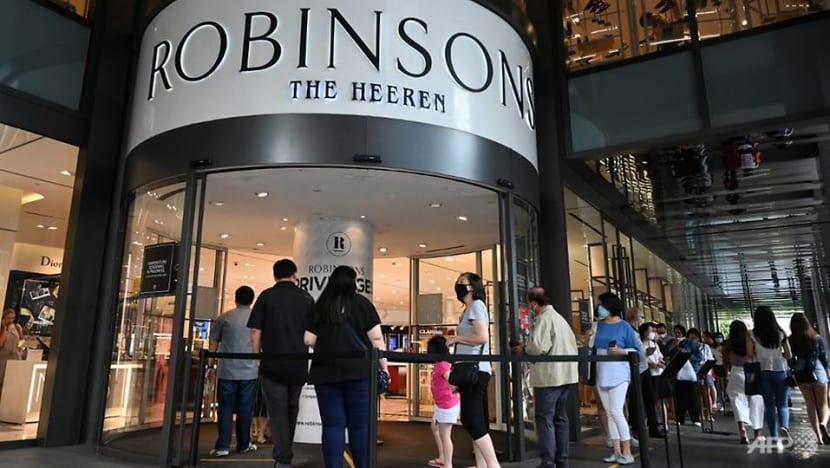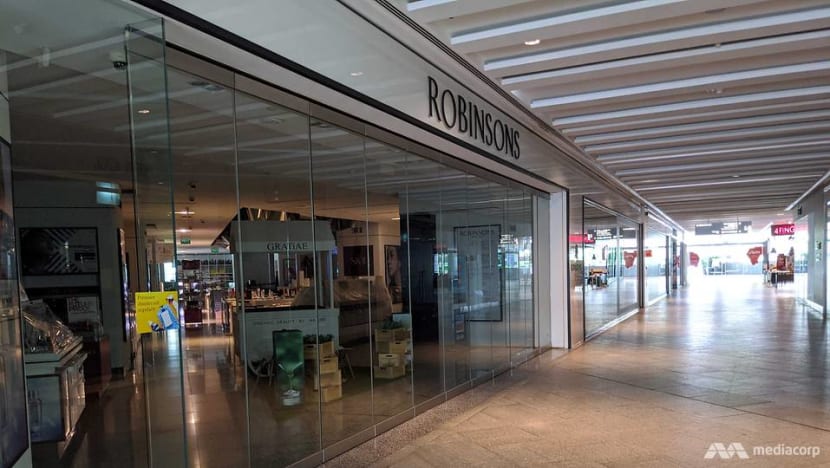'I doubt we will be paid': Robinsons' suppliers left in the lurch

Customers queue to enter a Robinsons department store at the Hereen along Orchard Road on Oct 30, 2020. (Photo: AFP/Roslan Rahman)
SINGAPORE: Days after department store Robinsons announced it was closing its last two outlets in Singapore, some suppliers said they are owed thousands of dollars by the 162-year-old retailer.
These suppliers sell their products on consignment, where they are paid only after goods are sold to customers.
Ms Vera Ong, the owner of tableware store Lovera Collections, said Robinsons owes her company about S$6,400 for sales between August and October.
When she asked Robinsons if she could collect her unsold stock from the department store’s The Heeren branch, staff members had told her no and said she would require approval from liquidators KordaMentha.
However, repeated emails and calls to KordaMentha director Hamish Bull went unanswered, she said.
It was only when Ms Ong turned up at The Heeren with her baby in tow that she realised the liquidators were there and could approve any such claims in person.
“There was no proper communication sent to vendors on how to (claim) their stock. Up till today we have other vendors messaging us to ask how we withdrew ours,” she told CNA.
READ: Robinsons to close last 2 stores in Singapore due to weak demand
In a Facebook post, KordaMentha said suppliers need to provide evidence that stock is held on consignment before returning the collection. This could be in the form of a consignment agreement with Robinsons or copies of purchase orders or invoices.
Lovera Collections is also owed about S$3,000 from honestbee, which was issued a winding up order by the High Court in July this year.
Ms Dawn Bey, who owns Pew Pew Patches - which sells embroidered iron-on and sticker patches - said she is owed more than S$1,000 for August and September.
She has since withdrawn her remaining stock, worth about S$8,000 from Robinsons.
Despite Robinsons closing its outlet at Jem in August, the 30-year-old said she did not expect the other stores to close as well.
“I’m not sure what is going to happen to the outstanding payments but from the experience with Gallery & Co, I doubt we will be paid,” she said, referring to the store at the National Gallery Singapore where her company also had consignment stock.
Gallery & Co announced its liquidation in August this year.
READ: Robinsons' customers in limbo over unfulfilled orders as suppliers await payments
Any revenue is likely to go towards paying Robinsons' other obligations, Ms Bey noted.
“Vendors are one of the last on the list so essentially, we put our stocks there to be sold but to pay everyone else. It’s a huge loss for us.”
A spokesperson for bed linen supplier Intero Enterprises, who declined to be named, said he had previously gone through the liquidation of stores such as Yaohan and Oriental Emporium, while working with other employers in the past.
The liquidators then had arranged for meetings with creditors to brief them of what they could expect, prior to the company formally announcing its closure, he said.
In contrast, vendors had no clue that anything was amiss with Robinsons, he said, noting they had been told to prepare for Black Friday, Christmas and Chinese New Year sales right up until mid-October.
He described the situation with Robinsons as “disorganised” in comparison.
“The owner cannot just push the thing to the liquidator and expect the liquidator to handle the whole thing. There must be some responsibilities the owner must take,” he said, adding he hopes the authorities can step in to assist vendors caught in such predicaments.
He said he had been informed by KordaMentha that a creditors meeting would be held no later than Nov 27.

"SHOULD NOT COUNT ON GETTING PAID IN FULL"
When contacted by CNA, a Robinsons spokesperson said: “With regards to all operations enquiries such as refunds and deposits, we are sympathetic to the concerns raised by stakeholders and we trust that the KordaMentha team is doing their very best and will swiftly handle the matter.”
CNA has contacted KordaMentha for more information.
The liquidator had previously told the media that suppliers would be paid for any sales made from Friday (Oct 30) onwards, and that it was assessing options to “preserve the value of Robinsons’ assets and maximise returns to creditors”.
However, the chances of suppliers getting paid in full are slim, said lawyers.
WATCH: 'My favourite store': Fans rush to Robinsons' 2 outlets after announcement of closure
“As the suppliers are unsecured creditors, they would usually rank last in the pecking order of claimants. Hence, the possibility of getting their outstanding payments would be below average and they should not count on being paid in full,” said Farallon Law Corporation managing director Nicolas Tang.
Mr Steven Lam, director of Templars Law, said vendors would typically have to file a proof of debt with the liquidators, as is the case with Robinsons.
“In extreme cases, they could consider asking the liquidators to look into the actions of the directors and the officers of the company to see whether there is a possibly of wrongful trading or even conspiracy,” added Mr Lam.
“None of Robinson’s suppliers will be able to sue for the outstanding payments during the liquidation process, when any legal action against Robinsons would not be allowed by the court,” said Mr Tang, noting this is to prevent any further deterioration of Robinsons' financial position.
READ: Do department stores still have a future in Singapore?
While working on a consignment basis puts small- and medium-sized enterprises (SMEs) at a disadvantage in such situations, Ms Bey said she would continue to do so as this is the “only model that exists in Singapore right now”.
“It’s rare to find someone who wants to buy wholesale from you, especially since you’re a local brand and can easily send stocks down when needed,” she said.
“Small companies have no choice but to take this model to extend their reach into different audiences. They’re too small to afford the rent of a shop either,” she added.
“So unfortunately, we have no choice but to continue working with this model. Perhaps the Government needs to relook at the laws to protect SMEs especially during liquidation as there are so many these days.”















